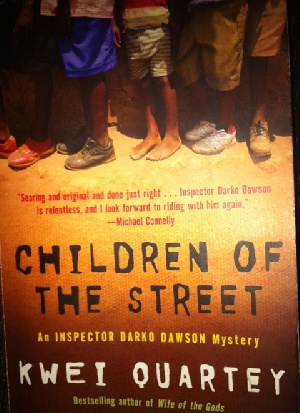Inspector Dawson rides again – this time among the street children of Accra
NB: This is a review of CHILDREN OF THE STREET specifically written for Ghanaian readers
CHILDREN OF THE STREET, Kwei Quartey’s second in his series of Inspector Darko Dawson mystery stories, is set among the street children of Accra. This time, the action seems to be slower than in the first novel but there are more murders and more intrigues. There is a serial murderer (or murderers) on the loose among the defenceless street children of Accra. The first victim, a badly mutilated corpse of a boy, is found near the Korle Lagoon. As Dawson, with his crew, investigates this crime, more victims keep popping up, each gruesomely mutilated in specific but different ways. His investigations take him ever deeper into the murky world of the street children of Accra. Who is, or are, behind these grisly murders and what is the motive? With the meagre police resources at his disposal, and his own personal problems to grapple with, will Inspector Dawson be able to catch the murderer(s) before he, or they, get too far?
What will a Ghanaian reader expect from a modern detective novel set in his country? Even though this is only a work of fiction, Ghanaian readers will be anxious about the kind of Ghana the author sells to the world. Having gone on foot among the street children of Accra who form the subject matter of his novel, Kwei Quartey succeeds in giving the Ghanaian a reflection of his own society many aspects of which will still come as a shock to him. For instance, we all know there are lots of street children in Ghanaian cities but how many of us know there are as many as 60,000 children in Accra alone who do not have a home to sleep in at night and whose work is on the streets of the city? 60,000 is a large number. Some district capitals in Ghana do not have as many residents. I found it difficult to believe this figure at first but Quartey may have done his home work well and the figure may be the correct estimate. If so, our country is in really deeper s..t than you ever thought!
This is not the only thing that will prick the Ghanaian reader. There is a vivid description of Ghana’s most notorious slum – Agbogbloshie, better known as Sodom and Gomorrah (wasn’t Vanderpuije bent on doing away with it, like the promises of previous governments to transform the place?). Emergency calls don’t get answered in our country. If you’re in a serious problem, it will be better to call in to a radio station which will broadcast your predicament. Perhaps the authorities, forced by the public exposure of their inefficiency, may then react. If you manage to reach a public hospital with your emergency, you may be lucky to be attended to after three hours. But if you know someone there at the hospital, that time can be knocked down considerably. Things used to work in our country, but that was a long time ago. The clock at Accra’s main railway station is permanently showing a time of 5.32. Built during the colonial times, the station may have been designed like any in Europe. Visit any railway station in Europe today built much earlier than the one in Accra and you will see similar clocks that are certainly older, most probably bought from the same company, still ticking to the correct time. Not in our country. Railway cars and refuse trucks (bola lorry) are “rusting into oblivion”. There is a digging project that has been going on for months. Yes, you know the rest of this story...
In a country with such problems, police detective work cannot be easy. The Ghana Police Service has its own problems. The CID in Accra has computers but they don’t work. Neither do the scanners. There is not a single forensic artist working in Ghana. The police find it difficult putting out composite pictures of suspected criminals. There is only one place where you can do DNA analysis – the lab at Korlebu. Try getting them to do an analysis for you, even if you happen to be the capital’s most brilliant detective, and see what happens.
This is the atmosphere in which Inspector Dawson must solve the crimes that are brought to his desk. Half Ewe and half Fante, he appears to be a lower middle class Ghanaian with some typically Ghanaian problems – and some non-Ghanaian habits. There are traces of poverty in his life and his only son, seven year old Hosiah, has a congenital heart disease that requires a necessary operation that the good Inspector and his wife cannot afford. In the old days, Ghanaian newspapers used to make eloquent appeals to the public to collect funds to send such rare cases abroad for corrective surgery. One wonders what has become of Ghanaian generosity. Inspector Dawson kisses his wife goodbye each day he sets off to work and his return is also marked with a kiss. In fact, they are always kissing each other. Even Hosiah is reminded to kiss daddy after he is dropped off at school. This is a very Ghanaian habit, indeed! There is a real upper class Ghanaian – a professor of Criminology. He is extremely rich from his professorial work. He travels abroad often where his academic knowledge is in high demand. This gives him a lot of money that enables him put up a huge mansion in East Legon (where else?). He has a well-stocked bar at home and drinks Heineken beer. Oh no, not Gulder or Stone but foreign-brewed Heineken that comes with the bottle top wrapped in aluminium foil! Between sips of his Heineken, he gives expert advice to the police on the nature of the murders.
Quartey, a medical doctor by profession, is very good at describing hospital procedures. The pathologist’s work is as superbly described as in the first book. But the descriptions I find most interesting are those of the women. A sixteen-year old street girl has “a tiny waist that flared to ... big, bouncy, round buttocks”. There is a woman in her thirties who heads an NGO devoted to street children who is “beautifully dressed in ... a white silk blouse that clung possessively to her succulent breasts”. Another chick is dressed in “condom tight black and white outfit”. Wow! If you’re looking for a gratuitous imaginary sexual candy, there is a good serving here.
Fans of the hardcore modern detective genre will be interested in the figure of Socrate, a computer buff. But Socrate is no girl with a dragon tattoo who is able to hack into private hard disks thousands of kilometres away. The level of computer technology in our country will not allow him to perform such feats and Socrate’s exploits, in the end, seem only tangential to the resolution of the main plot. The Socrate story is just one of a few sub-plots that do not seem to properly merge into the larger story. But this is just one edition in the series of mystery stories and unresolved strands from one novel can very well be taken up in later ones.
Unlike in his first book, Quartey stays largely authentic to our culture this time around. The edition that is currently available is, however, meant for the US reading public. This means that Ghanaian readers, with the possible exception of those who are residing in the US, will twitch a bit when they see Ghanaian characters saying things like “a couple problems”, “a couple hundred meters” or “a couple possibilities”. Americans may readily drop the “of” in that expression but the ordinary Ghanaian will not. Sometimes, things are calibrated in Fahrenheit and yards even though Ghanaians have now almost forgotten what those imperial measures stand for. A USB drive is called a “thumb drive” but Ghanaians have a funny name for it: they call it “pen drive”. And is Juaso really in the VR? These are, however, minor issues which do not detract from the enjoyment of the story. It is hoped that when an edition is published for the Ghanaian market, the relevant changes will be made.
The comparison with No 1 ladies detective series will be hard to avoid. Alexander McCall Smith’s books are carried more on the strength of the humour and the presentation of a simple African society than on the intricacies of the detective work. Kwei’s books are supposed to sell on the detective mystery itself. But can they still do as much to sell our country as Smith’s books did to sell Botswana? Only time will tell.
Readers who enjoyed Quartey’s first book will not be disappointed in this one and will be looking forward to the next one which will be set in the oil industry in Ghana. Perhaps we have been given a foretaste of that mystery. Towards the end of CHILDREN OF THE STREET, the murder of an oil executive is drawing resources away from Inspector Dawson’s already stretched manpower. But the murder of an oil executive is a matter of far greater importance than the killing of poor street children. We will have to wait to see if this is the genesis of that murder mystery.
CHILDREN OF THE STREET was released directly as a trade paperback. This may be a smart move that will put the book in a price range that Africans can afford. Africans are not great readers of works of fiction (if of anything else, for that matter) and the least one can do is not to price a book above them. It has been said that when Chimamanda Adichie’s prize winning novel, HALF OF A YELLOW SUN, had sold more than 200,000 copies in Europe and the Americas, her fellow Nigerians who so richly peopled the narrative, had picked up only 5,000 copies, many of them pirated versions. We, as Ghanaians, can do better than that, can’t we?
CHILDREN OF THE STREET is published by Random House, New York, 2011 (ISBN 978-0-8129-8167-4, eBook ISBN 978-0-679-60411-2). It is 335 pages including the acknowledgments and a glossary of words strange to non-Ghanaian readers. The print edition comes only in paperback and is available at amazon.com for $10.20 ($12.64 Kindle Edition delivered wirelessly). Dr. Kwei Quartey practices medicine in Southern California, rising early in the morning to write before going to work.
Kofi Amenyo (kofi.amenyo@yahoo.com)
Opinions of Tuesday, 11 October 2011
Columnist: Amenyo, Kofi
Book Review: Inspector Dawson rides again
Entertainment














